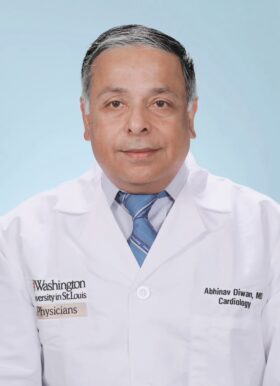
Abhinav Diwan, MD, FACC, FAHA
Professor of Medicine, Cell Biology and Physiology, Obstetrics and Gynecology
Division Chief of Cardiology at Saint Louis VA Medical Center
- Phone: 314-747-3457
- Fax: 314-362-0186
- Email: adiwan@nospam.wustl.edu
Related Links
Education
- MBBS (MD): All India Institute of Medical Sciences, New Delhi, India (1997)
- Internship, Internal Medicine: Baylor College of Medicine, Houston, TX (1998)
- Residency, Internal Medicine: Baylor College of Medicine, Houston, TX (2001)
- Fellowship, Cardiology: Baylor College of Medicine, Houston, TX (2004)
Board Certifications
- Cardiovascular Disease
- Echocardiography
Recognition
- Jeremiah Stamler Distinguished Young Investigator Award in the junior faculty basic science category in the Northwestern Cardiovascular Young Investigator’s Forum, 2007
- Finalist, Jay N. Cohn Young Investigator Award in Basic Cardiovascular Sciences, Heart Failure Society of America, 2007
- Finalist, Arnold and Louis Katz Basic Science Research Prize from American Heart Association, 2006
- Finalist, Melvin Marcus Young Investigator Award in Cardiovascular Science from American Heart Association, 2001
Clinical Interests
Echocardiography, heart failure
Research Interests
My research focuses on the role of lysosomes in cellular homeostasis and response to stress. We have developed the expertise and tools to experimentally perturb and evaluate lysosome biology, concomitantly with disease modeling in in vitro and in vivo systems. Our studies in the heart have focused upon the role of lysosome function in cardiac myocyte death, which plays a central role in causing heart failure in response to myocardial infarction and pressure overload hypertrophy. My lab has uncovered evidence for dysregulation of the lysosome machinery as a major contributor to cardiomyocyte loss in myocardial ischemia-reperfusion injury. Our work has described intermittent fasting as a strategy to stimulate lysosome function in vivo, to protect the myocardium against ischemia-reperfusion injury. In ongoing work, we have applied the strategy of intermittent fasting and activation of transcription factor EB (TFEB), a master regulator of lysosome biogenesis and function to rescue advanced cardiomyopathy triggered by genetic mutations that cause protein aggregate pathology and desminopathies, and in cardiac lipotoxicity. Our work has also uncovered the role of an innate immunity effector, TRAF2, which functions as an E3 ubiquitin ligase in effecting removal of damaged mitochondria via mitophagy in cardiac myocytes. This was the first description of an E3 ligase other than Parkin as being an effector of mitophagy; and emerging data from our lab and other researchers ascribe a critical role for TRAF2 and other E3 ligases, rather than Parkin as being critical for homeostatic mitophagy in various cell types. In collaborative work, we have extended these findings to uncover evidence for lysosome dysfunction in various CNS cell types in Alzheimer’s disease and in pancreatic beta cells in obesity-induced diabetes, underscoring the importance of acquired lysosome dysfunction in triggering multiple chronic diseases that are predisposed by common risk factors. The transcriptional networks that govern lysosomal biogenesis and function under stress are likely to be complex, and perhaps best interrogated in simpler organisms as C.elegans, wherein essential components of this machinery have been described in recent publications. In ongoing studies, we are focusing our discovery efforts to uncover transcriptional pathways that control lysosome biogenesis and function in this model. Our goal is to understand how lysosomal machinery is dynamically regulated in homeostasis and under stress, and to develop targeted strategies to harness lysosome function to treat diseases.